Key takeaways:
- Collaboration between nonprofits and businesses enhances the impact of social initiatives, showcasing the marketplace’s potential.
- Volunteer outreach fosters understanding and empathy, allowing for genuine connections and insights into community needs.
- Personal experiences in volunteer work often lead to transformative moments that reshape perspectives on resilience, community, and the importance of connection.
- Challenges such as securing volunteer participation and dealing with resource limitations highlight the need for creativity and adaptability in outreach initiatives.
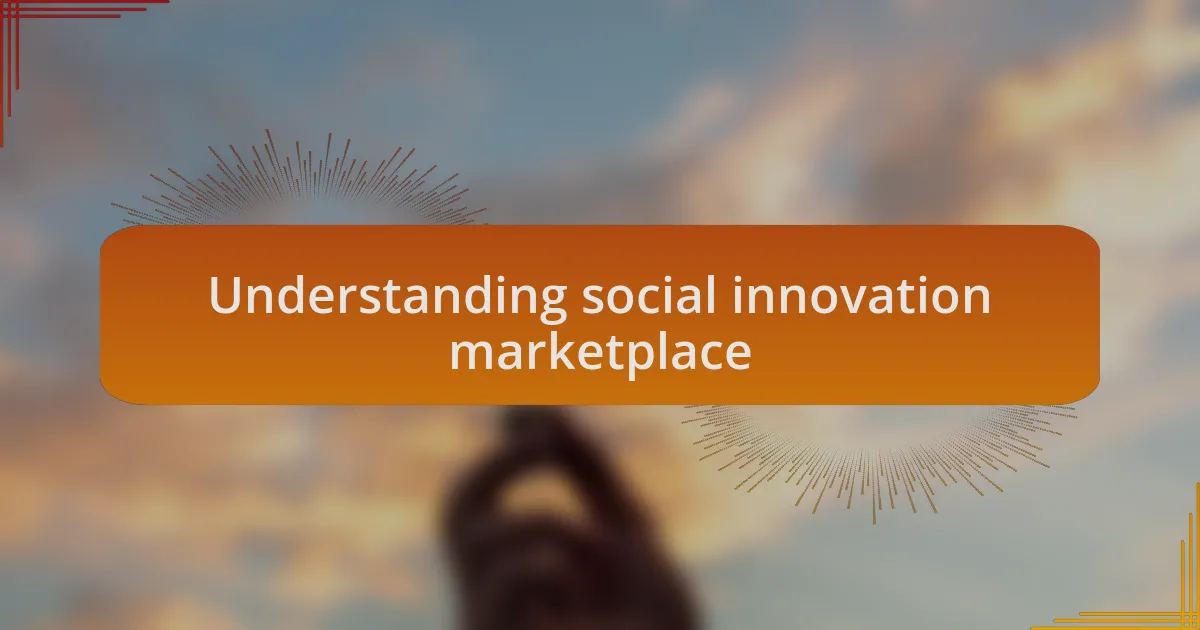
Understanding social innovation marketplace
The social innovation marketplace is a dynamic space where creative ideas meet concrete solutions to tackle societal challenges. For instance, I remember attending a workshop where a group of local entrepreneurs shared how they transformed food waste into nutritious meals for underserved communities. Hearing their passion resonated with me; it highlighted the marketplace’s potential to turn innovative thinking into impactful reality.
In this marketplace, collaboration is essential. I’ve witnessed firsthand how partnerships between nonprofits and businesses can amplify the reach of social initiatives. It’s fascinating to consider: what if every organization actively sought collaborations? Imagine how many more lives could be touched with the right alliances.
Beyond collaboration, understanding the needs of the community plays a pivotal role. During one of my volunteer experiences, I learned that addressing a problem requires listening to those affected. Their stories were powerful reminders of why innovation should always be rooted in real lives. Isn’t it compelling to think about how we can drive change by simply having genuine conversations?
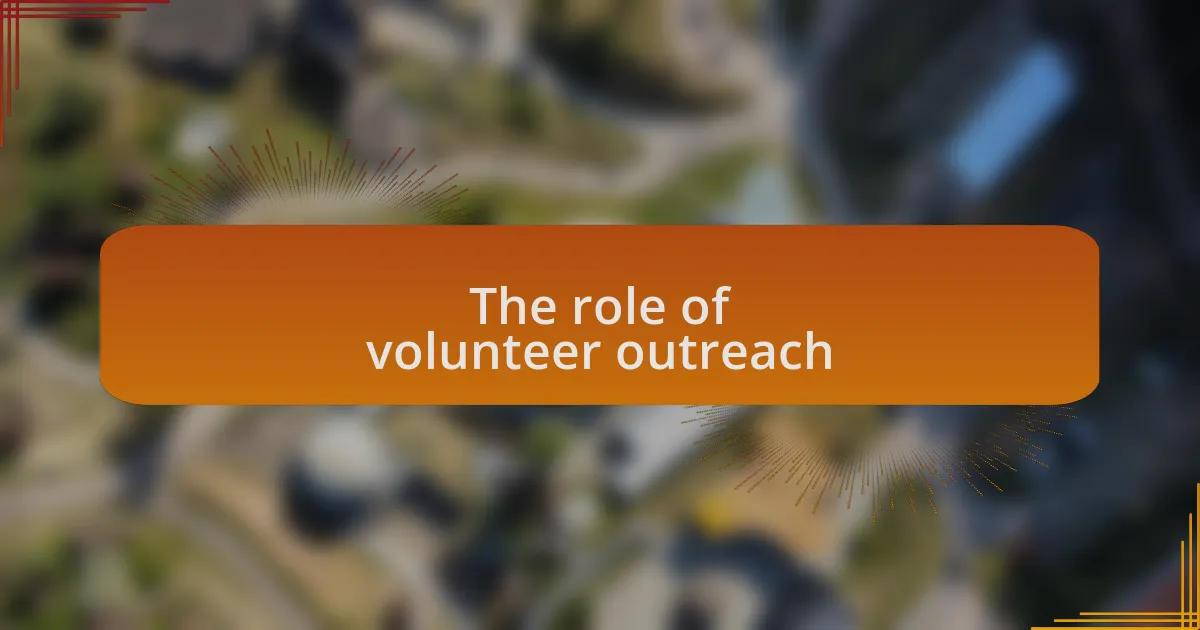
The role of volunteer outreach
Volunteer outreach serves as the heartbeat of social innovation, bridging gaps between communities and organizations. I recall a day spent volunteering at a local shelter, where I came face-to-face with individuals whose resilience was awe-inspiring. That experience solidified my belief that outreach doesn’t just build connections; it fosters understanding and empathy, which are crucial in designing effective solutions.
The relationship-building aspect of volunteer outreach is profound. One time, I helped organize a community clean-up, and the conversations I had with participants deepened my appreciation for diverse perspectives. How often do we get a chance to genuinely connect with someone outside our social circles? Those interactions remind us that every volunteer effort is an opportunity to share stories and ideas, which can catalyze future initiatives.
Moreover, active volunteer outreach allows us to tap into a wealth of local knowledge. During another project, I partnered with community members to address literacy issues. Their firsthand experiences informed our approach, highlighting that grassroots input is invaluable in shaping relevant and impactful programs. Isn’t it empowering to know that the key to effective outreach often lies within the very communities we aim to serve?
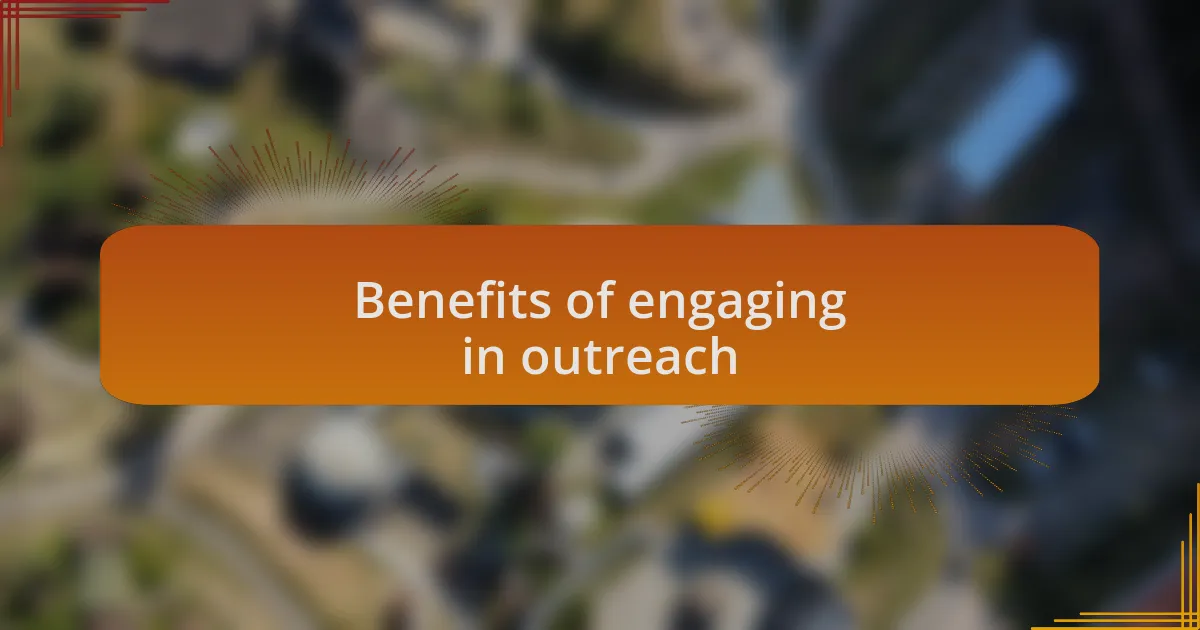
Benefits of engaging in outreach
Engaging in outreach provides a unique firsthand experience that often reshapes our understanding of societal needs. I remember working alongside a group of teenagers during a mentorship program, where their raw enthusiasm and fresh ideas inspired me. It made me realize that outreach isn’t just about giving back; it’s about learning from those we aim to help. Have you ever considered how much we can grow just by listening to someone else’s story?
Another incredible benefit is the sense of community it fosters. During a recent health fair I helped organize, I witnessed strangers come together, sharing resources and building networks that could support each other long after the event. Seeing individuals contribute their skills to a common cause created a ripple effect of kindness that I hadn’t anticipated. Isn’t it uplifting to witness the magic that happens when people unite for a shared goal?
Finally, outreach experiences serve as powerful reminders of our interconnectedness. While volunteering at a food bank, I encountered numerous families struggling yet finding joy in shared meals. This experience struck a chord with me; it reinforced the idea that our efforts, no matter how small, can provide hope and change lives. How often do we forget that every interaction has the potential to make an impact? It’s through these moments that I’ve learned even the smallest outreach can leave a lasting imprint on both the giver and the receiver.
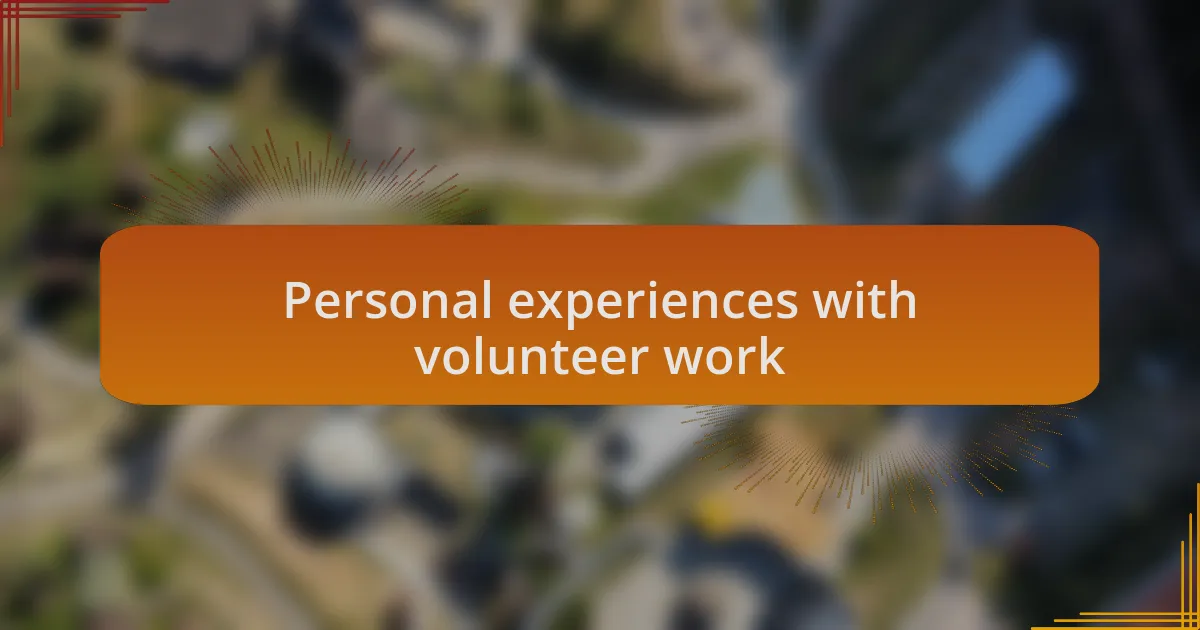
Personal experiences with volunteer work
I have had my share of unexpected experiences while volunteering that truly reshaped my perspective. One that stands out was when I spent a summer teaching art to children in a low-income neighborhood. Initially, I thought I would be imparting knowledge, but I quickly discovered it was the children who taught me about resilience and creativity. Their passion for expressing themselves through art sparked something deep within me – have you ever felt a sense of purpose ignite from the joy of helping others?
Another memorable experience occurred during a community cleanup event. Armed with gloves and trash bags, I joined a diverse group of volunteers, and what began as a chore transformed into a shared mission. As we laughed and shared stories while picking up litter, I felt a profound sense of belonging and unity. It’s fascinating how a simple act of cleaning could forge connections among strangers; have you ever felt that surge of camaraderie when working side by side with others?
A particularly poignant moment came to light while volunteering at a local shelter during the holiday season. I remember sitting down to share a meal with guests, hearing their stories over steaming bowls of soup. The warmth of that shared meal transcended the physical comfort – it was a lesson in humility and gratitude for me. In those moments, I realized that while I came to offer help, I received so much more in human connection. Isn’t it remarkable how our outreach efforts can turn into lessons that reshape our views on empathy and kindness?
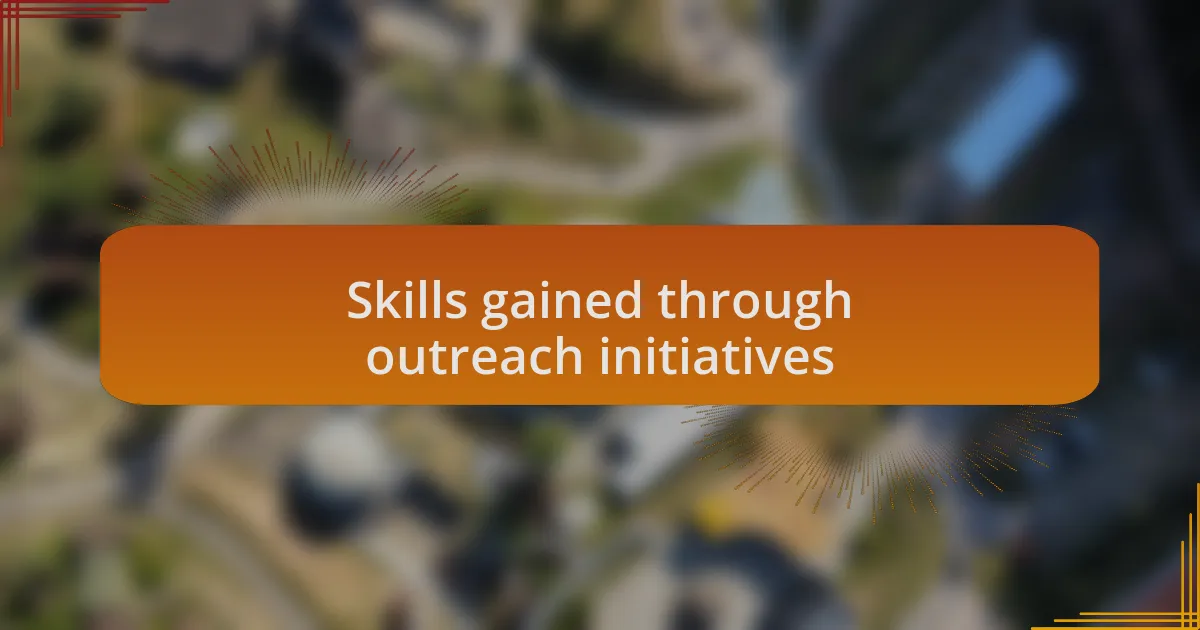
Skills gained through outreach initiatives
Through my volunteer outreach efforts, I discovered a variety of skills that went far beyond the tasks at hand. For instance, while organizing a fundraising event, I unexpectedly sharpened my communication and organizational abilities. The challenge of rallying support required me to effectively express my vision, connect with diverse stakeholders, and coordinate logistics—skills that I now realize are invaluable in any aspect of life. Have you ever noticed how each small step in outreach can lead to significant personal growth?
Working with a team of volunteers also honed my ability to collaborate and embrace diverse perspectives. I recall a specific project where we created a community garden. Each member brought unique ideas and backgrounds to the table. As we debated plant choices and garden layouts, I realized that listening and remaining open-minded not only improved our outcomes but also enriched my understanding of group dynamics. Don’t you think that building such collaborative skills is essential for any meaningful social initiative?
Additionally, outreach initiatives pushed me to become more adaptable and problem-solving focused. During a food drive, we faced an unexpected shortage of donations. Instead of feeling defeated, we brainstormed alternative strategies and reached out to local businesses for support. That experience taught me the importance of resilience and creative thinking in the face of challenges. How often do we find that our ability to pivot can turn setbacks into opportunities for innovation?
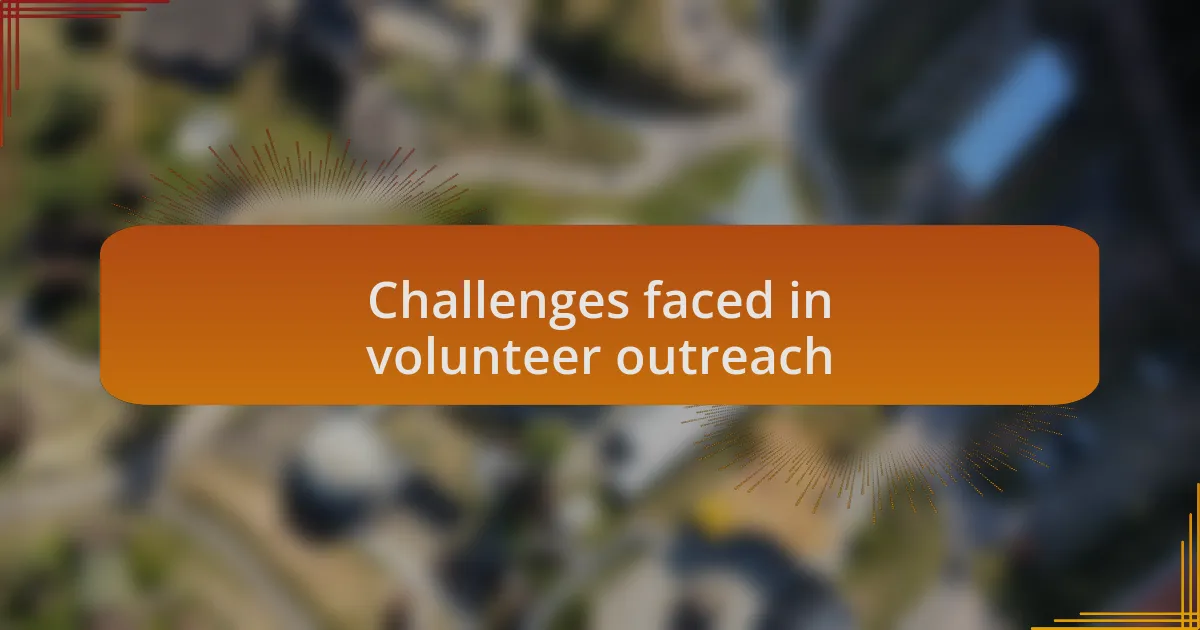
Challenges faced in volunteer outreach
Outreach can be incredibly rewarding, but it doesn’t come without its share of challenges. One major hurdle I faced was securing consistent volunteer participation. I vividly remember one particular event where we had a low turnout, leaving us scrambling at the last minute. It made me wonder: How can we effectively motivate people to commit when life gets in the way? I learned that maintaining enthusiasm and showing appreciation for volunteers’ contributions was essential in building a supportive community.
Another obstacle I often encountered was the varying levels of experience among volunteers. During a health awareness campaign, I noticed some volunteers needed more guidance than others. This disparity sometimes slowed down progress and tested my patience. Reflecting on this situation, I realized that embracing these differences is crucial. It’s vital to create an inclusive environment where everyone feels valued, regardless of their skill level. After all, how can we expect everyone to shine if we don’t nurture their unique strengths?
Lastly, resource limitations are a persistent challenge for outreach initiatives. I recall working on a project that aimed to provide mentorship for at-risk youth, but we were short on funding and materials. I felt a wave of frustration wash over me at first, as I grappled with the reality that our vision might not materialize. This experience taught me the importance of leveraging partnerships and tapping into local expertise. Have you ever found yourself facing a resource crunch? It often inspires a deeper level of creativity and fosters collaboration that drives meaningful impact.
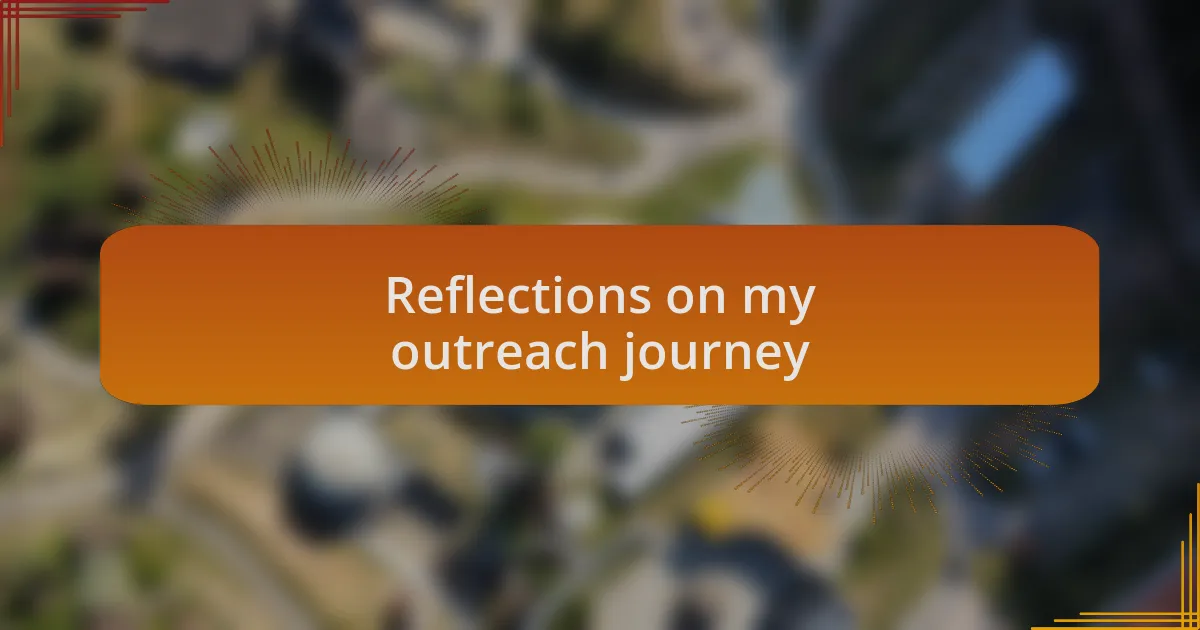
Reflections on my outreach journey
Reflecting on my outreach journey, I’ve come to appreciate the transformative power of connection. I remember one evening spent at a local food bank where, amidst the chaos of organizing donations, I struck up a conversation with a fellow volunteer who shared her inspiring story of resilience. That moment struck me deeply—are we not all united by our shared humanity? It reinforced my belief that outreach isn’t just about the act of giving; it’s also about building relationships and understanding different perspectives.
Another memorable aspect of my outreach has been the emotional highs and lows that accompany the work. After a successful community event, I felt a rush of joy watching the smiles on the faces of those we helped. Yet, there were days when the weight of the world felt heavy, especially when I encountered heartbreaking situations of individuals still struggling despite our efforts. How do we keep hope alive when faced with such challenges? I learned that vulnerability can be a strength, allowing us to recognize our own feelings while strengthening our commitment to make a difference.
Lastly, I’ve discovered that personal growth often comes from navigating unexpected situations. During one particularly challenging outreach project, I had to step up as a leader unexpectedly when the coordinator fell ill. I was terrified—could I inspire others in a moment of crisis? Stepping into that role forced me to grow in ways I had never imagined, realizing that leadership is not just about authority; it’s about empathy and adaptability. Isn’t it fascinating how the most daunting challenges often lead to our greatest lessons?